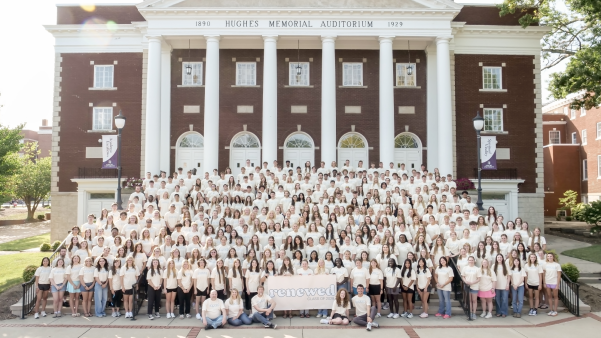From my journal: I am romanced by a comment attributed to Henri Matisse. “Artists,” he said, “should have their tongues cut out.” What could he mean? Perhaps he felt that the artist’s message was to be communicated only by paint on canvas. Or perhaps he worried that artists were spending too much time explaining their work and that they should let the painting speak for itself. Maybe Matisse simply thought artists were blabbing too much in Parisian coffee-houses and that anything but painting was a misuse of time. Then again, Matisse may have been saying something else I’m not smart enough to discern.
Might we Christians consider Matisse’s advice—that is, having our tongues cut out? While I can think of certain of my preaching friends who would die at this thought (my treasured friend, Tony Campolo, comes to mind, he thought smiling), there is a sublime merit to the idea.
The modern Christianity I know is far too wordy. We talk about what we should do and lash ourselves for what we’re not doing. We talk about what we are doing and why we’re doing it (or why we think we’re doing it). And then, when it’s all over, we talk about what we did and what significance we think it had. Oh, and we talk an awful lot about what the “the world” is or shouldn’t be doing. I fear that I am a major donor to this palaver. These paragraphs may be exhibit A.
Much of this talking, I fear, seems to be bent on convincing ourselves that we (or our organizations) are significant or that what we are doing deserves other people’s praise or, alternatively, their financial gifts. As I said, some of our talk seems targeted on those who have pursued other ways than ours. If we can highlight how bad, how different, how misguided they are, then we can justify why it is that we are doing what we’re doing. And that makes us feel better.
Going over old journals, I am struck with my own wordiness. Many things about which I was formerly passionate are meaningless today. And some things on which I stood silent now stand out as life-altering (for myself or others). How many billions of words have I spoken which were pointless, inaccurate, unwise, hurting to others, slanderous, or pompous.
Matisse, where were you when I needed you?
Many quote St. Francis as saying something like, “Preach all you can, and, if necessary, use words.” Whether or not it was Francis’s idea, the thought has weight, and it causes me to recall a poem written by Elizabeth Patton Moss:
St. Francis came to preach. With smiles he met
The friendless, fed the poor, freed a trapped bird,
Led home a child. Although he spoke no word,
His text, God’s love, the town did not forget.
I have much more to say on this topic, but Matisse just got to me.
Notes from England: I listened to Bill Hybels talk to 2,500 or more UK pastors and church leaders about the power of the church to amend society, and I marveled. Forty years ago the church would have been a laughingstock to most serious thinking people. The parachurch organizations once called themselves an arm of the church (implying that they were doing what the church could not or would not do), and they did (and do) a great job of keeping priorities before us. But now Bill and Rick Warren and others have woven together modern tools and ideas (vision casting, sensible organizational management, fresh thoughts such as seeker sensitivity and purpose driven come to mind) and inspired us all with a new sense of the church’s place in the world. All over the place men and women are planting churches, reviving old ones. It’s a great, great day. Who could have predicted Summit Conferences on Leadership, Forty Days of Purpose programs, Alpha, and the house church movement?
On preaching at an Anglican Church in the UK: Three churches combined to have a worship service: Anglican, Black Pentecostal, and Baptist. When we sang, fathers held their children in their arms and danced. Others waved richly colored banners. Even I got my hands over my head. I loved it. And when the Bible was opened, how they listened! Lots of good things happening in the UK.
Someone slipped into my hand a copy of Wisdom of the Sadhu, the teachings of Indian Christian mystic Sundar Singh (Plough Publishing). It has marked my devotional life for the last couple of weeks. Two examples:
- Salt crystals cannot give flavor to food unless they dissolve. If we dissolve the salt in a pot, it disappears but it does not cease to exist. Indeed, it can then give flavor to thousands of grains of rice.
- (A hunter picked up colored stones and used them to shoot at birds with his sling. One by one the stones disappeared into the river. He kept one. A jeweler saw it and offered him thousands of rupees for it.) “When the hunter recognize the value of his stones,” Sundar Singh said, “he cried out: ‘Woe is me! I have been carelessly shooting gems into the river. I could have been a millionaire. But thank God I saved at least this one.'”
Matisse would suggest that I leave the interpretation of the last paragraph to the reader.
Pastor and best-selling author Gordon MacDonald is chair of World Relief and editor at large of Leadership.
To respond to this newsletter. Write to Newsletter@LeadershipJournal.net.
Copyright © 2003 by the author or Christianity Today/Leadership Journal.Click here for reprint information on Leadership Journal.








